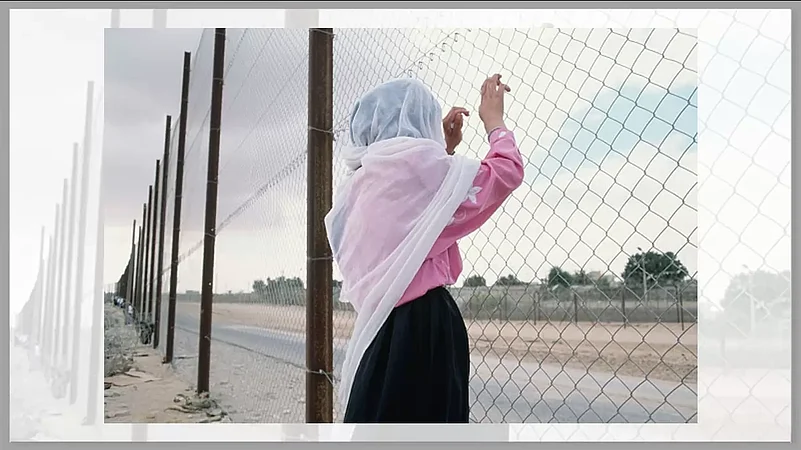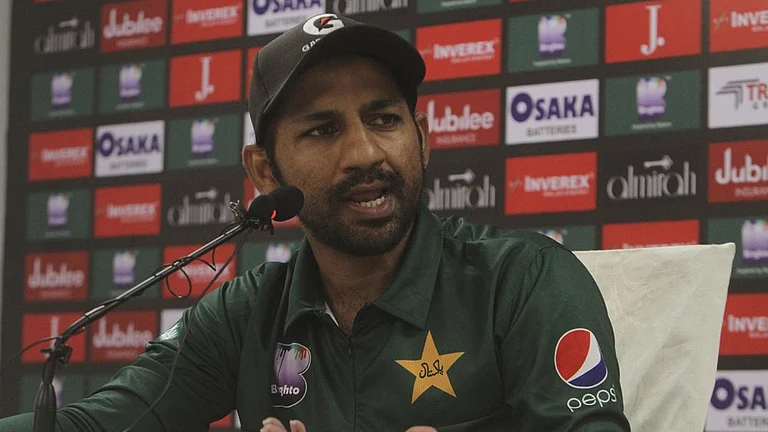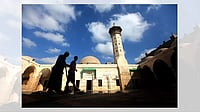This past September marked 21 years of not living with my mother. I was 17 and she was 49 when I left Gaza and her. I bet we are simultaneously counting the years, piling up questions and fears, but pretending not to. Those 21 years witnessed the longest process of cutting the umbilical cord and building a breezy terrace, where we can meet and be side by side, while not sticking too much that it would hurt again.
I am her only child, and she is technically my only parent. We had a specific routine since I started primary school. Every morning I'd make her coffee and wake her up. She'd heat my milk and braid my hair. We'd cry as we watch Sally, the saddest cartoon on our local TV channel, then we'd make fun of the stupid answers on trivia shows. We’d sleep side by side each night, up till my 15th birthday when I announced that I'd like to try sleeping alone in my actual bed. She had to say Sure, I guess, but not before asking if I was bothered by her, and I of course said Not at all. In the last two year we’d been together, we'd study side by side, I for my high school exams and she for her master’s in civil law.
For 17 years of our young life, we had and held each other, for better or for worse, for richer or for poorer, in sickness and in health, till life or borders do us part. I once heard that you need the same duration of a relationship to get over it. We are now 21 years away, crossed the promised threshold by 3 years, but we’re still -somehow- entangled.
When I chose to live in Cairo for many years, it was to be “next door” to Gaza, hoping for a more regular life that can fit us both within a 6-hour car ride. In those years the Gaza borders with Egypt rarely opened, and if so, the ride would take from 20 to 72 hours depending on the multiple checkpoints along the way. I moved later to Berlin, I was only further by a 4-hour flight time and a Schengen visa. But when mama got the visa, there was Covid-19. Still, I was one time zone away, we kept waking up together and sleeping together, I…she was there, when stuff happened on either side of the phone call.
This past September I completed two years in New York. One more academic degree, one more continent, one more visa, and 6 more time zones further from mama. I am 38 this year, she is 70, the difference between us is the same, 32 years minus 6 weeks. We both look younger than our real age, it is deceiving, even to us. But the time that passed lives within us and between us. More of me is becoming her, and more of her is drifting away from me. How can similarities and differences grow at the same time? Like her; coffee or tea after 2 pm now keep me awake, my white hairs are only slowly appearing, my skin is bruising very easily, my knees -despite being much more fit- hate the stairs, my social generosity is overpouring, my romantic relationships are not happening.
Unlike her, I am a pessimist and a perfectionist, but more artistic. I’m less and less impressed by public work and she cannot not make it her identity. She was the Tomboy in her 8-daughter-one-son family, but I am the queerer one. And despite me wanting kids since I was a teenager, I am the childless one. I couldn’t care less about our conservative society, and she couldn’t care less about throwing awkward comments at younger people, my friends, and me.
This year, I wake up when she is done with work, and she goes to bed when I’m going to my evening writing class. And despite, or maybe due to, those many hours and miles and questions and fears and silences, I feel closer to my mother. I want to be closer to my mother. And despite our youngish looks, I can see how we aged. She with her old-lady comments, me with my out-of-no-where patience in taking these comments and baking a joke instead of a burst of anger.
(Farah Barqawi is a Palestinian author, performer, and a feminist organizer. Her poetry and essays have appeared in multiple languages on online platforms and in multiple anthologies, such as 'Ce que la Palestine apporte au monde' [IMA, France, 2023] and 'We Wrote in Symbols' [Saqi Books, UK, 2021].)



















